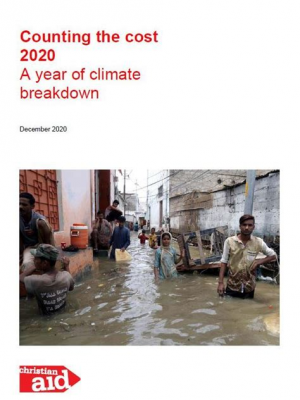Christian Aid end-of-year study identifies costliest climate disasters

New analysis of the top 20 costliest extreme climate disasters over 2023 has revealed a "global postcode lottery stacked against the poor" where the relative economic impact of disasters varies considerably across countries.
International development charity Christian Aid, which published the analysis in their report Counting the Cost 2023: A year of climate breakdown, warns "more climate finance is desperately needed" including investment in early warning and early action.
The top 20 list of the costliest extreme disasters of 2023 across a range of 14 countries shows that some countries - through size, geography, or other factors - are more prone to experience disasters.
The charity found the highest per capita cost of natural disasters was the wildfires which affected Hawaii in August. The cost of these wildfires' averages over $4,000 per person. This is far beyond the second costliest per capita, Guam's storms in May, which cost almost $1,500 per head of population.
Pointing to the "global postcode lottery", Christian Aid explains disasters are worse for those countries which are unable to withstand them because of less resilient homes, where many people are employed in agriculture vulnerable to extreme weather, and places which lack government investment in prevention or rebuilding.
Cyclone Freddy, which features on the list, hit the population of Malawi in 2023. Mofolo Chikaonda, a widow aged 69 and comes from southern Malawi, explained "the worst negative impact of Cyclone Freddy that I shall never forget in my entire life is the destruction of the only house that we struggled to construct"
Within 45 days, Christian Aid's partners reached 2,500 households through a range of activities based on a rapid needs assessment including mosquito nets to protect against malaria, mobile clinics to help people process emotional trauma, sanitation, and cash distributions.
Nushrat Chowdhury, Christian Aid's Climate Justice Policy Advisor in Bangladesh, said: "Cyclone Freddy was a reminder that communities who have contributed the least to the climate crisis are suffering the worst. Loss and damage costs are in the hundreds of billions of dollars annually in developing countries alone. Wealthy nations must commit the new and additional money required to ensure the Loss and Damage Fund agreed at COP28 can be quickly get help to those that need it most."
No corner of the globe was spared in 2023 with all six populated continents represented in the list. Even large countries with big populations feature on Christian Aid's list: USA, China and Mexico all have populations more than 100 million yet experienced disasters which cost tens of dollars per head of population, meaning billions of dollars at the national level.
Chief Executive of Christian Aid, Patrick Watt, said: "With 2023 the hottest year on record, the effects of climate change are more obvious than ever before.
"The human cost of the climate crisis is seen increasingly in homes washed away and lives ended by floods and storms, and crops and livestock lost to drought. This year was once again devastating if you happened to live in a climate vulnerable country.
"While some disasters make the headlines, like the wildfires in Hawaii, in many cases devastating climate-related disasters pass unnoticed by the wider world.
"When it comes to the climate crisis, there is a global postcode lottery that is stacked against the poor. In poorer countries, people are often less prepared for climate-related disasters and have fewer resources with which to bounce back. The upshot is that more people die, and recovery is slower and more unequal. There is a double injustice in the fact that the communities worst affected by global warming have contributed little to the problem.
"Governments urgently need to take further action at home and internationally, to cut emissions, and adapt to the effects of climate change. And where the impacts go beyond what people can adapt to, the loss and damage fund must be resourced to compensate the poorest countries for the effects of a crisis that isn't of their making."
Audrey Brouillet, researcher at the Institut de Recherche pour le Développement, France, commented: "For many places in the world, climate change is making extreme weather such as floods or droughts more frequent and intense. Places that are dry are getting drier and places that are wet are getting wetter. This is already happening.
"In the future, we expect this intensification to worsen due to continuous fossil fuel burning and greenhouse gases emissions. Above +2°C warming, some regions such as Northern Africa could experience more intense droughts by up to +50% of known values, whereas other regions like Central Africa will experience more severe heavy rains, by up to +70%."
Mohamed Adow, Director of Power Shift Africa, a Nairobi-based climate and energy think tank, said: "It is clear that the costs of the climate crisis are already weighing heavily on some of the poorest people in the world, many of whom are the least responsible for causing these disasters. It underlines why it is so vital that the world phase out fossil fuels as quickly as possible.
"It also shows the gaping hole at the recent COP28 climate summit in Dubai: the lack of finance for developing countries to adapt to the impacts of climate change. At the moment poorer countries are being left to foot the bill for these costs themselves, despite them being caused by excessive fossil fuel burning in richer nations. Until we address this huge adaptation gap, humanity's response to the climate crisis will be failing. It's vital we right this wrong at next year's COP meeting and ensure proper adaptation finance is provided to meet the needs of the vulnerable."
Read the full report here: www.christianaid.org.uk/sites/default/files/2023-12/counting_the_cost_2023.pdf


















